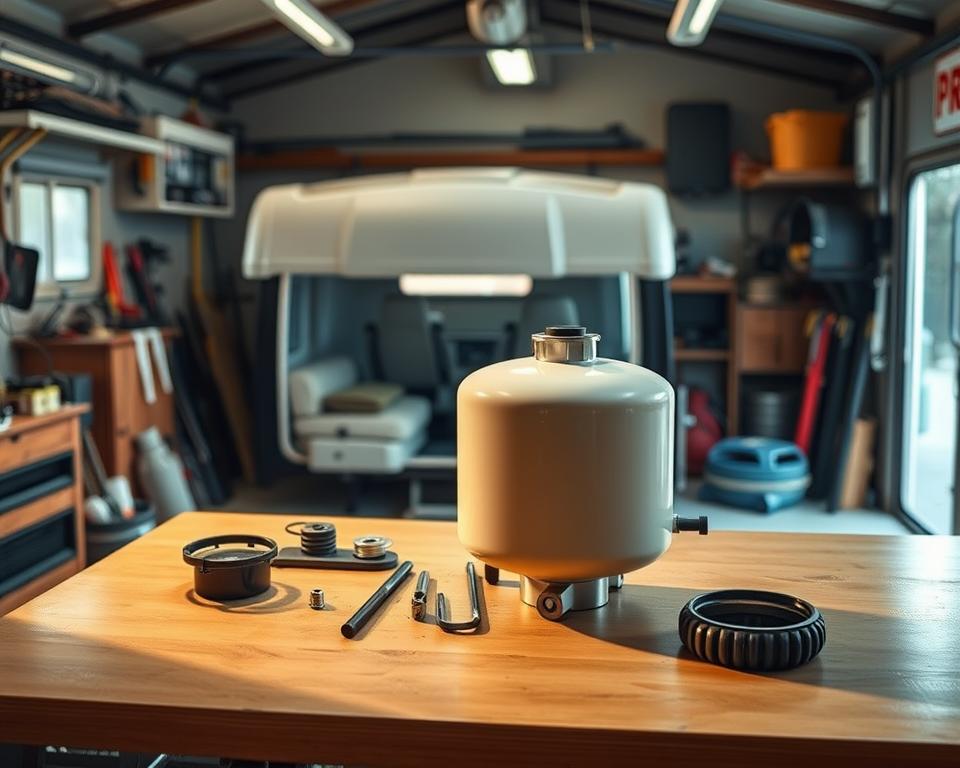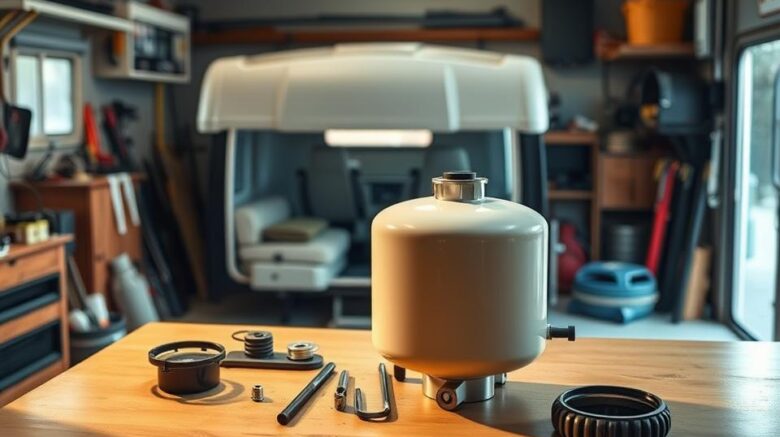RV Sewer Pump Guide: Key Maintenance Advice
Ever considered the functioning of your RV’s sewer system? Grasping the ins and outs of your RV waste pump can avert mishaps, enhancing your outdoor adventures. It focuses on overseeing waste smoothly and warding off bad odors. In this handbook, you’ll discover key maintenance methods for RV black water pump. Every tip is created to support your waste disposal system’s ideal functionality.
Grasping Your RV Sewer Pump System
The camper sewage pumping setup is vital for waste handling, making outdoor stays more pleasant. It includes two main tanks: the sewage holding tank for solid waste and the grey water tank for water from sinks and showers. Distinguishing between these tanks is important to stop clogs and keep your RV operating smoothly.
An RV macerator pump is a favored option for refuse disposal. It shreds solid waste into minute particles, facilitating disposal. Alternatively, you can choose, a standard waste pump is available. It competently moves waste without shredding, for those wanting a simpler option.
Mastering your RV’s waste pump setup is crucial to preventing problems and ensuring smooth examinations. Operating the system effectively can prevent messes, uplifting your outdoor adventures.
Significance of Routine Care
Caring for your RV sewage disposal pump is vital for a trouble-free journey. Without proper upkeep, you may run into odors, clogs, or backups. These glitches can mar your road trips.
Scheduled upkeep thwart such issues and lengthen your system’s life. By reviewing hoses and seals, you improve efficiency. A regularly checked RV sewage pump provides hygienic operation, letting you enjoy nonstop trips.
Regular servicing also leads to financial savings over time. Disregard can cause significant problems, requiring cost-intensive maintenance. Putting resources into regular maintenance keeps your motorhome in prime shape, conserving money long term.
How Frequently to Service Your RV Septic Tank?
Determining the proper interval to service your RV Septic tank is vital for its upkeep. It’s recommended to pump every three to five days during use. For short trips, after-journey servicing may do the trick.
Frequency depends on multiple considerations. Tank size and usage level are vital. Preferably pump when it reaches 66% capacity. This helps ensure steady waste movement and prevent blockages.
Checking your RV Septic tank capacity is essential for a hassle-free trip. Oversee properly your camper’s effluent to avoid issues while traveling.

Top Techniques for Tank Drainage
Accurately discharging RV tanks is crucial for your motorhome’s hygiene and performance. Always empty first the black tank to let the grey water rinse leftover solids. This technique ward off clogs and ensures smooth operation.
Select a top-grade sewer hose for disposal. A sturdy hose prevents leaks and secures connections. Add a tank rinser for a complete flush, using water pressure to remove lingering waste, improving cleanliness.
Thorough draining prevents residue buildup, stopping foul odors and potential issues. To maintain an well-functioning sewage system in your motorhome, follow these guidelines:
- Always add a tank treatment after emptying to control odors and decompose waste.
- Watch capacity to avoid overflows.
- Perform routine pump inspections for clogs and wear.
- Perform a deep tank flush every 4–8 weeks, even during less frequent trips.
Implementing these practices enhances your sewage system’s lifespan and performance, ensuring memorable excursions.
Avoiding Foul Odors and Clogs
For a nice outing, warding off smells is key. Keep enough water in tanks to aid in decomposition, warding off unpleasant odors. Also, choosing camper-safe TP helps prevent clogs, ensuring uninterrupted operation.
For enhanced refuse control in campers, try enzymatic solutions. These digest residues efficiently, easing upkeep. Ensure vent pipe clearance to keep air moving freely in the plumbing system.
Careful waste habits is crucial to avoiding tank issues. Refrain from disposing of wipes, feminine products, and paper towels. These non-degradable objects can cause serious blockages. Using these practices helps maintain a cleaner camping environment.
Care Recommendations for RV Waste Pumps
Maintaining your RV’s sewer pump system is vital for smooth journeys. Verify seal condition frequently to stop seepage. Faulty seals can cause accidents, harming your RV.
To eliminate odors and maintain cleanliness, sanitizing is key. Carry out intensive cleans quarterly to prevent buildup, ensuring the system functions optimally. These steps are necessary for maintaining a on-board grinder, promoting long life and efficient operation.
Oiling valve mechanisms is another important task. It helps ward off seepage and improve functionality. Monitoring tank sensors is essential for correct levels, preventing backups and unexpected pump issues. Maintaining vigilance makes your RV adventures more sanitary and more enjoyable.
Clues for Hiring a Professional Pump Service
Identifying septic problems ahead can save you from bigger headaches. A key sign you need a expert emptying is slow draining. When sinks and toilets take longer to clear, it often points to blockages. It suggests your system may be backed up.
Persistent odors are another clear sign of sewage troubles. Bad odors lingering despite cleaning suggest trapped waste. It’s crucial to inspect the clear elbow attachment when dumping waste. Remaining waste visibility signals it’s time for pro maintenance.
Technicians employ water-jet systems to dismantle stubborn blockages efficiently. Neglecting these signs can grow into major problems. Therefore, it’s vital to seek help immediately when issues arise.
| Indicators of Sewer Trouble | Recommended Response |
|---|---|
| Delayed Drainage | Inspect for clogs; arrange professional pump-out |
| Persistent Odors | Examine system; book professional RV pump-out |
| Obvious Debris | Contact pump service for thorough cleaning |
Selecting the Ideal RV Waste Grinder
When choosing an RV macerator pump, consider its capacity, durability, and compatibility with your RV’s size. A high-quality macerator is vital for efficiently breaking down waste. This is especially crucial for RVs requiring constant pumping. High-end pumps optimize sewage handling, ensuring a smoother RV lifestyle.
Different models cater to specific demands. For an educated choice, focus on these key factors:
- Capacity: Check output volume compatibility.
- Durability: Opt for models built to endure travel demands.
- Ease of Use: Select pumps with intuitive controls.
- Compatibility: Verify the pump fits your RV plumbing.
Carefully considering options when choosing an RV macerator pump enhances travel enjoyment and ensures efficient pump performance.
Troubleshooting Your RV Sewer Pump
Accurate diagnosis for your RV sewer pump is essential in fixing common sewage issues before they worsen. If you notice sluggish emptying, unplanned backflows, or persistent odors, respond swiftly. These are obvious indicators of malfunction requiring attention.
Start with checking the pump, its connections, and hoses. Look for any clogs that could slow flow. Ensure inlet and outlet fittings are leak-free. Also, verify the pump’s power supply for consistency.
If basic checks don’t uncover the issue, listen to the pump’s sound. A unit that’s overly noisy or too quiet may have internal damage. Also, inspect for leaks, as these can magnify sewage problems. With these troubleshooting steps, many RV owners can find and fix issues early, avoiding costly repairs.
Sustained Maintenance for RV Sewer Pumps
For continued reliability, commit to regular sewer pump upkeep. Clean the system consistently to prevent clogs. Set up and follow a maintenance routine, keeping everyone informed of their roles. This greatly increases your waste system’s lifespan.
Informing yourself and others on appropriate use is key. This avertss issues and fosters shared responsibility. The result benefits both users and the sewer system.
- Routine inspection of hoses and connections
- Maintain clear filter screens
- Book expert service once a year
- Select suitable additives
Sticking to these steps enhances your camper’s sewage system’s durability and keeps it effective, making travels more enjoyable.
Final Thoughts
Caring for your RV sewer system diligently is key for hassle-free camping adventures. Regular attention to RV sewer system maintenance greatly minimizes problem risks, letting you immerse in the journey. By knowing your system and using reliable sewage methods, your trips will be free of waste management woes.
Using the key tips from this guide boosts RV waste management and improves your travel comfort and safety. Keep your sewer pump in top shape by following best upkeep practices and fixing potential issues promptly.
Being watchful and well-informed about your RV sewer system yields benefits. It provides homely comforts while exploring. Here’s to joyous and untroubled journeys!
Frequently Asked Questions
How can I tell it’s time to empty my RV Septic tank?
Empty your RV Septic tank once it’s two-thirds full.
How do black and grey tanks differ?
Black tank is for sewage waste. Meanwhile, the grey tank collects water from basins and showers.
When to service my RV sewer pump?
Perform maintenance every few months.
Which products are best for RV sewer pump care?
Choose RV-approved enzyme formulas and quality hoses and rinsers.
What prevents blockages in RV plumbing?
Avoid flushing non-biodegradable items.
When should I call a pro for RV pump service?
Watch for slow drainage, recurring odors, or visible residue in the elbow.
Tips to optimize camper macerator performance?
Choose a robust model and follow manufacturer guidelines.
Key inspection points for a thorough RV sewer cleanse?
Inspect all connections and hoses.
What long-term care tips help my RV sewer pump?
Inspect hoses, treat tanks, and schedule annual pro servicing.
How often should I empty my RV Septic tank with regular use?
Service tank frequently for group travel or heavy usage.
